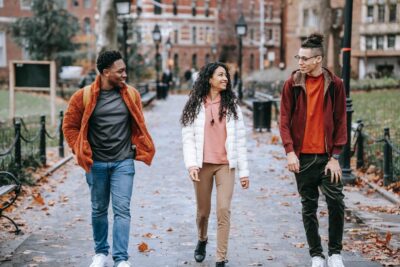How we’re reimagining the way students apply to college
July 25, 2022, By Jonathan April, Managing Director, College Greenlight
Blogs
How we’re reimagining the way students apply to college

July 25, 2022 6 min read
For the past 10 years, my team and I at College Greenlight have worked to reduce barriers to higher education for the students who most often face them. We believe applying to college can and should be more accessible. But expanding access to higher education requires more than lowering one-off logistical, financial, and systemic barriers. If we want to see significant progress, we need to transform the admissions process in a revolutionary way.
Last year, we set out to begin this transformation. Teaming up with Concourse, we created Greenlight Match – a streamlined process that would help students find their college match, and help colleges recruit hundreds more students they might not have identified otherwise. The pilot exceeded our team’s and our partners’ expectations.
This post reflects on how Greenlight Match started, the impressive impact from our pilot year, and a plan to expand in the 2022-2023 academic year.
Addressing inequities in the current process: How Greenlight Match works
Overall college enrollment has continued to drop, especially among lower-income students. This trend further highlights the importance of making admissions and financial aid application processes more equitable. The college application process is typically very time consuming and without considerable guidance – at school, in a college readiness program, or at home with parents who have previously navigated the process – it can be daunting.
Many of the inequities embedded in the college admissions and financial aid process were recently highlighted by the National Association for College Admission Counseling (NACAC) and the National Association of Student Financial Aid Administrators (NASFAA). Their joint report, “Toward a More Equitable Future for Postsecondary Access,” focused on the ways systemic discrimination impacts college enrollment – including the college application itself.
The report highlights Greenlight Match as one way colleges could use technology to address barriers in the application process, from unnecessary application fees to information gaps to inequity in access to college advising. To be considered for admission via Greenlight Match, students don’t have to submit an extraneous application or supplementary materials.
Greenlight Match is a streamlined, equitable student-college match process-not a college application. Well in advance of traditional college application deadlines, students work with their high school counselor or CBO adviser to create a profile on the platform. Instead of an extensive admissions application that requires multiple essays and recommendations, the profile highlights students’ academic interests, achievements, and college preferences. Once students complete their profile, counselors verify and submit their materials to admissions offices. This results in fewer missing documents and a higher completion rate for enrollment offices. Institutions review anonymized student profiles to match with students and make admission offers. Those matches are announced three to four weeks after counselors certify students’ profiles, giving students the chance to review financial aid offers and complete enrollment milestones well before high school graduation.
First year success far exceeded our partners’ expectations
Chicago was the ideal launchpad for Greenlight Match. Illinois is home to over 70 colleges and universities, has the third largest school district in the nation, and is the birthplace of College Greenlight. Unsurprisingly, the highest concentration of our CBO and college partners is also in Illinois. They work with us to close these opportunity gaps for students in cities like Chicago, where housing, education, and employment inequities have directly impacted college attainment rates.
0%
Chicago Public Schools (CPS) students from an economically disadvantaged background.
0%
Ninth grade CPS students who aspire to go to college.
0%
Ninth grade CPS students projected to earn a bachelor’s degree within six years of enrolling in college.
Source: College Possible Chicago
Counselors and advisers from 24 community-based organizations and charter schools nominated students to the pilot program and helped them navigate the process. Participating organizations include:
The ten colleges and universities that initially signed on to pilot Greenlight Match in Chicago are Augustana College, Bradley University, Butler University, Columbia College Chicago, Elmhurst University, Hope College, Illinois State University, Knox College, North Park University, and Valparaiso University. Participating institutions evaluated nearly 700 student profiles, made almost 2,000 admissions offers (three offers per student on average), and offered $135 million dollars in scholarships on the platform during our fall Match events.
“I’ve got to screenshot this and show my mom. I said, ‘Mom I’ve already been accepted to five colleges!’ It was only mid-October and it all happened so fast.”
Jamiah Greenlight Match Student
More students began to see college possibilities with this reimagined approach to attending and affording college. One of our CBO partners noted that, matches made in our pilot year presented students with new college possibilities that many had not considered previously.
“Many of our students have not been exposed to the various college options that are available to them as well as the opportunities for financial support at these institutions. Greenlight Match provided this opportunity to our students by bringing colleges to them and not only did our students receive various college enrollment offers but also almost $11 million dollars in scholarship offers as well.”
Jason Carter Director of College Access, College Possible
Greenlight Match empowers students to make strong college choices without relying on name recognition to inform where they apply. At one of our partner high schools, the Director of Postsecondary Efforts said his students completed the Match profile faster than the traditional application process and matched with affordable institutions where they can be successful.
“We have students attending seven out of the eight partner colleges from the initial list. In talking with my kids heading to Elmhurst, Bradley, Knox and Valparaiso, they said they would never have considered applying since they never heard of these schools. But after talking with them through the text messaging system online, and then visiting campus individually, and then receiving the further financial aid process, they were sold.”
Keith Hebert Director of Postsecondary Efforts, Civitas Education Partners
Expanding Greenlight Match to six new cities
On the heels of a successful pilot year, we look forward to increasing the size and impact of the program. For the 2022-2023 cycle, we plan to expand Greenlight Match into additional cities while expanding our impact in Chicago. We’re partnering with colleges, universities, CBOs, and school networks to grow six new regional cohorts across the US.
New Greenlight Match regions include:
- Dallas/Ft. Worth
- Houston
- New York City
- Philadelphia
- Minneapolis/St. Paul
- Atlanta
These six key markets have strong college access networks, robust college options, and high populations of underserved students who would benefit from the program. We are partnering with college access leaders, school districts, and colleges with a strong commitment to recruit over 13,000 underserved students.
For our second year, we already have more than 40 college partners for Greenlight Match, including University of Rochester, University of Pittsburgh, Stony Brook University, St. Olaf College, Texas Christian University, Southern Methodist University, Auburn University, and Georgia State University. We expect to work with more than 75 total institutions this fall. New CBOs and schools piloting Greenlight Match include KIPP Atlanta and New York, Urban Assembly Schools, NYU College Advising Corps, Uncommon Schools, One Goal, Bottom Line, Uplift Education, ASP Dallas, EMERGE Houston ISD, and Advise TX.
Greenlight Match represents a huge step toward a more equitable, accessible, and inclusive admissions process – one where doors are opened for more students who might not otherwise have a straightforward path to college. College and university partners who join our efforts will be integral to maximizing the program’s local impact and building long-term recruitment relationships. We look forward to seeing an increase in equitable enrollment outcomes alongside the growth of Greenlight Match next year and beyond.
Ready to find out more?
Connect with our team to learn more about Greenlight Match in your region.
Get more insights
More Blogs

How does your enrollment office compare?

3 new Naviance features that are transforming college planning
